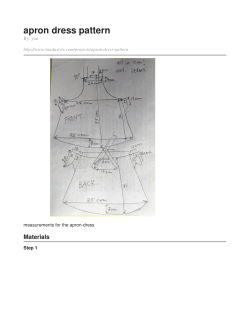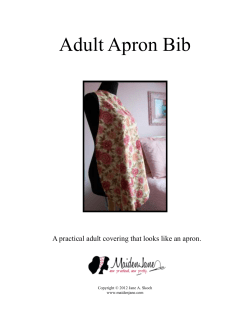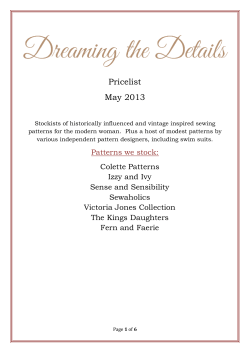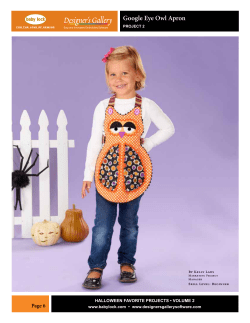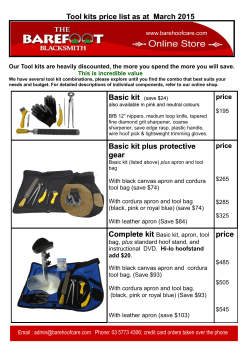
The Use and Care of Lead protective equipment
Page 1 of 2 The Use and Care of Lead Protective Equipment All the staff in a radiographic room during X-ray exposures must stand behind a protective barrier or use protective aprons or whole body protective barriers of not less than 0.25 mm of lead equivalent. Gonadal shielding should be used for all patients, of not less than 0.25 mm of lead equivalent. Exceptions occur only when gonadal shielding will interfere with the diagnostic procedure. Human holders can be used and must be provided with adequate protection, 0.5 mm lead when standing in the primary beam and 0.25 for scatter (secondary radiation). The minimum requirement is 0.25 mm of lead equivalent shielding for an occupational worker, not standing in the primary beam. Aprons and gloves must have radiation attenuation of no less than 0.5 mm lead equivalence at 150 Kilovoltage Peak Full aprons should cover the front of the body from the throat to within 10 cm of the knees as well as the sides of the body. All staff working in fluoroscopy or cineangiography must wear a lead apron. If the operator’s eyes or thyroid are likely to receive dose from radiation, it is advisable to wear additional protection for these organs. When wearing a lead apron, the badge should be placed on the collar outside the apron. For individuals monitored using two film badges, one should be worn on the collar (outside the apron) and the other should be worn at the waist level under the apron. Except for the patient, only the staff and ancillary personnel required for the medical procedure or training shall be in the room during the radiation exposure. The manufacturer’s recommendations regarding the handling and storage of protective clothing must be strictly observed. Lead aprons should be stored on hangers to prevent cracks in the protective lead. Inspection and testing of protective clothing must be performed as described by manufacturer. Care and Use of Lead Aprons and Gloves Lead aprons should be checked fluoroscopically at least on an annual basis for their shielding integrity. Rejecting an apron depends on the location, area size and number of flaws. It is best to keep the number of flaws to a minimum. 1645 Mail Service Center - Raleigh, North Carolina 27699-1645 Phone: (919) 814-2250 Visit our website www.ncradiation.net Lead Apron Rev. 3/24/15 State of North Carolina | Division of Health Service Regulation | Radiation Protection Section | Radiology Compliance Branch N.C. DHHS is an equal opportunity employer and provider of services. Page 2 of 2 Inspection: Storage: Cleaning: If possible, fluoro inspect your aprons at least annually. Aprons should be hung up by the shoulder(s) or on an approved apron hanger. Aprons should never be folded or creased. If possible, do not lay or store aprons on a flat surface. Clean daily and deodorize by scrubbing with a soft bristle brush. Never use products containing bleach. Rinse thoroughly with water to remove residue. Hang to dry. Do not machine launder or dryclean. Lead Apron Integrity Check Note: Lead aprons should never be folded. Cracks in the lead lining can develop at the fold, reducing the useful life of the apron. Objective: To assure that lead aprons, gloves, gonadal shields and thyroid collars provide an ideal level of protection. Performance Measurement: No breaks in lead lining of protective garments. Frequency: At least annually or manufacturers recommendations. Equipment: Lead aprons, gloves, gonadal and thyroid shields. Fluoroscopic or radiographic unit. STEPS: Option 1: image intensified fluoroscopy unit 1. Lay out the item on the table. 2. Examine the entire item using the fluoroscope. 3. Record results on the Annual Quality Control Checklist. Option 2: image intensified fluoroscopy unit is not available: 1. Closely inspect each item for kinks and irregularities. 2. Take a radiograph of suspect areas. 3. Process the film and look for breaks in the lead lining. 4. Record results on the Annual QC Checklist. CORRECTIVE ACTION: Any item displaying breaks in the lead lining should be replaced. When purchasing new lead aprons, gonadal shielding or gloves, make sure the lead equivalent is sufficient with the N.C. Regulations for Protection Against Radiation. Companies that will accept Lead (Pb) Aprons for Disposal and Perform Silver Reclamation: Click Here 1645 Mail Service Center - Raleigh, North Carolina 27699-1645 Phone: (919) 814-2250 Visit our website www.ncradiation.net Lead Apron Rev. 3/24/15 State of North Carolina | Division of Health Service Regulation | Radiation Protection Section | Radiology Compliance Branch N.C. DHHS is an equal opportunity employer and provider of services.
© Copyright 2025
